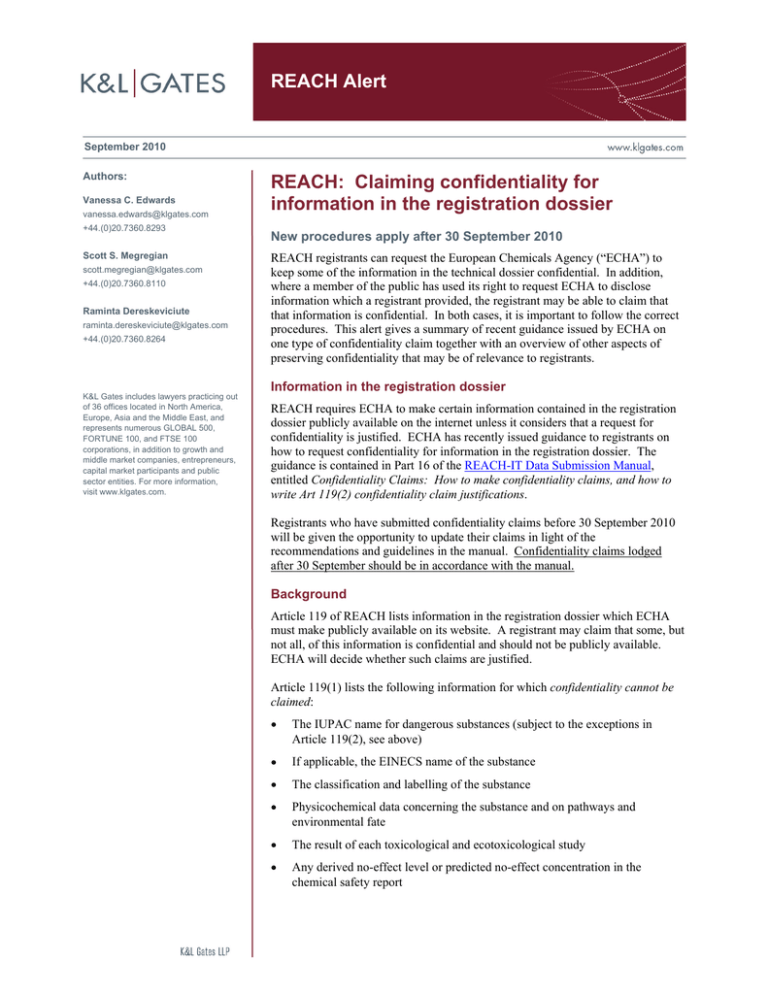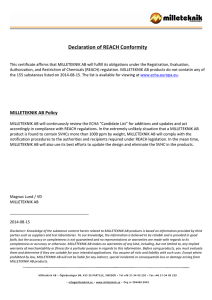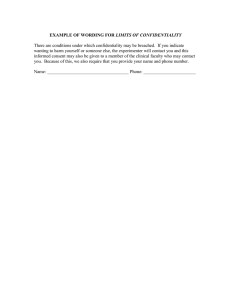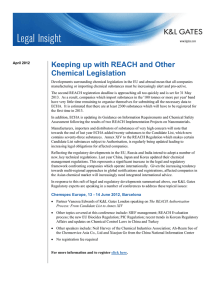
REACH Alert
September 2010
Authors:
Vanessa C. Edwards
vanessa.edwards@klgates.com
+44.(0)20.7360.8293
Scott S. Megregian
scott.megregian@klgates.com
+44.(0)20.7360.8110
Raminta Dereskeviciute
raminta.dereskeviciute@klgates.com
+44.(0)20.7360.8264
K&L Gates includes lawyers practicing out
of 36 offices located in North America,
Europe, Asia and the Middle East, and
represents numerous GLOBAL 500,
FORTUNE 100, and FTSE 100
corporations, in addition to growth and
middle market companies, entrepreneurs,
capital market participants and public
sector entities. For more information,
visit www.klgates.com.
REACH: Claiming confidentiality for
information in the registration dossier
New procedures apply after 30 September 2010
REACH registrants can request the European Chemicals Agency ( ECHA ) to
keep some of the information in the technical dossier confidential. In addition,
where a member of the public has used its right to request ECHA to disclose
information which a registrant provided, the registrant may be able to claim that
that information is confidential. In both cases, it is important to follow the correct
procedures. This alert gives a summary of recent guidance issued by ECHA on
one type of confidentiality claim together with an overview of other aspects of
preserving confidentiality that may be of relevance to registrants.
Information in the registration dossier
REACH requires ECHA to make certain information contained in the registration
dossier publicly available on the internet unless it considers that a request for
confidentiality is justified. ECHA has recently issued guidance to registrants on
how to request confidentiality for information in the registration dossier. The
guidance is contained in Part 16 of the REACH-IT Data Submission Manual,
entitled Confidentiality Claims: How to make confidentiality claims, and how to
write Art 119(2) confidentiality claim justifications.
Registrants who have submitted confidentiality claims before 30 September 2010
will be given the opportunity to update their claims in light of the
recommendations and guidelines in the manual. Confidentiality claims lodged
after 30 September should be in accordance with the manual.
Background
Article 119 of REACH lists information in the registration dossier which ECHA
must make publicly available on its website. A registrant may claim that some, but
not all, of this information is confidential and should not be publicly available.
ECHA will decide whether such claims are justified.
Article 119(1) lists the following information for which confidentiality cannot be
claimed:
The IUPAC name for dangerous substances (subject to the exceptions in
Article 119(2), see above)
If applicable, the EINECS name of the substance
The classification and labelling of the substance
Physicochemical data concerning the substance and on pathways and
environmental fate
The result of each toxicological and ecotoxicological study
Any derived no-effect level or predicted no-effect concentration in the
chemical safety report
REACH Alert
Information claimed
confidential
Other information in the
Safety Data Sheet
Guidance on safe use
Analytical methods if requested in
accordance with Annexes IX or X which
make it possible to detect a dangerous
substance when discharged into the
environment as well as to determine the
direct exposure of humans
In contrast, the following information, listed in
Article 119(2), will not be made available on
ECHA s website if the registrant submits a
justification accepted as valid by ECHA as to
why publication is potentially harmful for the
commercial interests of the registrant or any
other party concerned:
If essential to classification and labelling, the
degree of purity of the substance and the
identity of impurities and/or additives known
to be dangerous
The total tonnage band within which the
substance has been registered
The study summaries or robust study
summaries required in the registration dossier
Certain information in the safety data sheet
The trade name of substance
IUPAC (International Union of Pure and
Applied Chemistry) names for dangerous
substances which are non-phase-in or only
used as intermediate/in scientific R&D/ in
PPORD
How to make a confidentiality claim
under Article 119(2)
To claim confidentiality, there is provision for a
flag to be set against each piece of information
entered in IUCLID. Fees in the following ranges
(with the lower end of each range relevant for
smaller companies) must be paid for each piece
of information for which confidentiality is
claimed. The Manual contains more detail of
how the fees are calculated.
Information claimed
confidential
Degree of purity and/or
identity of impurities or
additives
Tonnage Band
Study summary or robust
study summary
Fee
338 to 4500
113 to 1500
338 to 4500
Trade name(s) of the
substance
IUPAC Name of non-phase
in substances which are
dangerous
IUPAC Name of dangerous
substances used as
intermediates, and/or in
scientific research, and/or in
product and process oriented
research and development
Fee
225 to 3000
(for all
use(s)/use(s)
advised
against)
113 to 1500
113 to 1500
113 to 1500
A justification going beyond a simple statement
that the information is a business secret must be
entered for each claim. In particular, it should be
demonstrated that disclosure of the information
would potentially harm the registrant s or a third
party s commercial interests. This requires it to
be shown that:
The information is known only to a limited
number of persons, and typically that the
registrant or third party has taken specific
measures to keep the information secret
The registrant or third party has a
commercial interest worthy of protection
There is a causal link between publication of
the information and the potential harm
It should also be indicated whether
confidentiality is claimed only until a certain
date or the occurrence of a particular event
(which must be specified) or for an unlimited
time. In addition a contact name must be given
to enable ECHA to be in contact with the
registrant during the assessment of the claim.
The Manual recommends that each of the above
elements should be described in no more than
two or three sentences and that the justification
as a whole should not exceed one A4 page.
Templates and examples are provided. Since
ECHA will only accept very brief claims for
confidentiality, companies should consider
carefully what grounds of justification they
provide.
If a confidentiality flag is set and no justification
is provided, registrants may re-submit their
dossier once only to include justification.
September 2010
2
REACH Alert
Companies should therefore be sure to both
set the flag and provide justification as they
otherwise risk losing the opportunity to claim
confidentiality.
Challenging a decision rejecting a
confidentiality claim
If ECHA rejects a confidentiality claim, it must
notify a decision rejecting a confidentiality claim
to the registrant in writing (where appropriate by
electronic means).
The registrant may request a review from
ECHA within two months of receipt. This is an
administrative review and not an appeal to the
Board of Appeal, which has no jurisdiction over
confidentiality claim decisions.
ECHA must take a decision within two months of
the request; the registrant may challenge the
decision before the General Court or complain to
Ombudsman
Other confidentiality issues
As indicated above, Article 119 of REACH lists
the information from the registration dossier
which ECHA must make available on its website,
subject to the possibility of claiming
confidentiality for certain items of such
information. Article 77(2)(e) of REACH requires
ECHA in addition to maintain all other
information it holds on registered substances, the
classification and labelling inventory and the
harmonised classification and labelling list
established in accordance with the CLP
Regulation. EU citizens or companies have a
right of access to such information subject to a
limited number of exceptions. ECHA must
disclose information on request unless disclosure
would undermine the protection of: the public
interest, the privacy of personal data, commercial
interests, court proceedings and legal advice or
the purpose of inspections, investigations and
audits (subject to any overriding public interest in
disclosure).
REACH Art 118(2) provides that the following
are normally deemed to undermine the
protection of commercial interests unless
urgent action is necessary to protect human
health, safety or the environment, such as
emergency situations :
Details of full composition of mixture
Precise use, function or application of
substance or mixture
Precise tonnage of substance or mixture
manufactured/placed on market
Links between manufacturer/importer and
his distributors/DUs
Where ECHA receives a request for access to a
document which originates from a third party
(e.g. a REACH registrant or CLP notifier), it will
refuse the request if one of the exceptions above
applies and will grant the request if the document
has already been disclosed or it is clear that the
disclosure would not affect one of the interests
mentioned above; in all other cases, ECHA must
consult the third-party author. If ECHA intends
to give access against the explicit opinion of the
author, it must so inform the author and draw his
attention to his right to challenge the disclosure
before the EU General Court or make a
complaint to the Ombudsman.
Confidentiality in the C&L Inventory
ECHA has also recently indicated that
companies who are not registering substances
under REACH by 30 November 2010 but who
are obliged to notify the classification and
labelling of substances to ECHA as of 3 January
2011 may keep the IUPAC name confidential in
the case of non-phase in substances and
substances used only as intermediates and/or in
scientific R&D and/or in PPORD. Such
confidentiality claims can only be made using
IUCLID. An alternative name must be provided
for dissemination by ECHA.
Why K & L Gates is uniquely placed to
assist with REACH issues
K&L Gates provides a comprehensive legal
service designed to assist industry groups and
individual companies to meet their REACH
obligations and maintain their ability to market
and use their products based on sound
compliance strategies. The team s practice has
developed over the last seven years based on
experience gained during the adoption and
ongoing implementation processes of this
complete and radical review of the European
Union s (EU) chemicals policy. Our REACH
team has advised extensively on numerous
aspects of REACH to manufacturers, importers,
traders, distributors, downstream users, and trade
associations/consortia in numerous sectors. We
also have considerable experience of advocacy,
litigation and dispute resolution in the REACH
space. For further information, please see our
REACH practice brochure [link].
September 2010
3
REACH Alert
Anchorage Austin Beijing Berlin Boston Charlotte Chicago Dallas Dubai Fort Worth Frankfurt Harrisburg Hong Kong London
Los Angeles Miami Moscow Newark New York Orange County Palo Alto Paris Pittsburgh Portland Raleigh Research Triangle Park
San Diego San Francisco Seattle Shanghai Singapore Spokane/Coeur d Alene Taipei Tokyo Warsaw
Washington, D.C.
K&L Gates includes lawyers practicing out of 36 offices located in North America, Europe, Asia and the Middle East, and represents numerous
GLOBAL 500, FORTUNE 100, and FTSE 100 corporations, in addition to growth and middle market companies, entrepreneurs, capital market
participants and public sector entities. For more information, visit www.klgates.com.
K&L Gates is comprised of multiple affiliated entities: a limited liability partnership with the full name K&L Gates LLP qualified in Delaware and
maintaining offices throughout the United States, in Berlin and Frankfurt, Germany, in Beijing (K&L Gates LLP Beijing Representative Office),
in Dubai, U.A.E., in Shanghai (K&L Gates LLP Shanghai Representative Office), in Tokyo, and in Singapore; a limited liability partnership (also
named K&L Gates LLP) incorporated in England and maintaining offices in London and Paris; a Taiwan general partnership (K&L Gates)
maintaining an office in Taipei; a Hong Kong general partnership (K&L Gates, Solicitors) maintaining an office in Hong Kong; a Polish limited
partnership (K&L Gates Jamka sp. k.) maintaining an office in Warsaw; and a Delaware limited liability company (K&L Gates Holdings, LLC)
maintaining an office in Moscow. K&L Gates maintains appropriate registrations in the jurisdictions in which its offices are located. A list of the
partners or members in each entity is available for inspection at any K&L Gates office.
This publication is for informational purposes and does not contain or convey legal advice. The information herein should not be used or relied
upon in regard to any particular facts or circumstances without first consulting a lawyer.
©2010 K&L Gates LLP. All Rights Reserved.
September 2010
4






